JuniusEdwards.com
Junius Edwards
Writer | Ad Man | Husband & Father
A life well lived
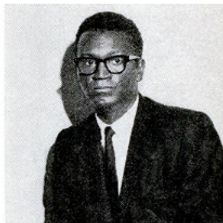
Writer
As a writer, Junius Edwards (1929 – March 22, 2008) was primarily focused on African-American Civil Rights, racial problems in the South, and the impact of racial, psychological, and personal problems on the African American soldier.
Born in Alexandria, Louisiana, Edwards' parents died when he was young and he was brought up by relatives in Houston and Chicago. Junius quit his last year of High School in Chicago to join the U.S. Navy with a desire to be a pilot, but instead he was made a mess boy, which was not uncommon for black recruits at that time. He refused to do that job and ended up in the brig twice, and he soon got a bad-conduct discharge from the Navy. Without telling the U.S. Army that fact, he joined their ranks at 18 years of old and served for nine years in Korea and Japan, eventually working in the Judge Advocate General Corps and the U.S. Army Counter Intelligence Corps.
By this time Junius realized his passion for words and writing, and after getting an honorable discharge from the Army, he received his GI Bill and decided to go abroad to study at the University of Oslo in Norway because he admired the writing of "the father" of Realism, 19th-century Norwegian playwright and poet Henrik Ibsen. In Norway, Edwards continued to write, and in 1958 won first prize in the Writer's Digest Short Story Contest for "Liars Don't Qualify" and in 1959, he received a Eugene F. Saxton Fellowship for creative writing. Among his published works are the short stories "Duel with the Clock," "Mother Dear and Daddy," "New Blood," and “Liars Don’t” Qualify” where Edwards confronts the hypocrisy of the town that denies returning soldiers the same freedoms they had fought to preserve. This story is also the foundation for his novel "If We Must Die" which was published by Doubleday and Howard University Press.

Ad Man
The hit TV show "Madmen" was certainly entertaining, but the show's Producers and writers did not get the whole story right about the Advertising industry in the 1960s and 70s.
Junius Edwards and several other African-Americans were working at that time in creative positions, and starting-up their own Ad agencies as well. Watching the "Madmen" TV series, one is lead to believe that Blacks were just working as doormen, elevator operators, secretaries, and delivery men at that time. Wrong!
During the 1960s in New York City, Junius worked as a copywriter for top advertising agencies such as Ogilvy & Mather, Ted Bates Inc., and Norman, Craig, & Kummel. After working as a copywriter and gaining experience, Junius Edwards went on to establish one of the first Black-owned advertising agencies in New York City, Junius Edwards Inc. - with clients and brands that included Faberge, Liggett & Myers, Carver Federal Savings Bank, Robert SONNEMAN Lighting, Greater New York Savings Bank, Random House and others.
Edwards later worked as a Marketing Consultant, a Special Fellow for United Nations Unitar, and several entrepreneurial endeavors in the health, travel, publishing, and airline industries.
Junius Edwards' work has been mentioned and covered in - The New York Times, Media Decisions Magazine, Standard Directory of Advertising Agencies, Business Week, Advertisers Weekly, Black Enterprise, Ebony Magazine, Jet Magazine, Crisis Magazine, Negro Digest, Publishers Weekly, The Transatlantic Review, The Greenwood Encyclopedia of African American Literature, The Cambridge Companion to the Literature of the American South, Encyclopedia of African American Business History, The Concise Oxford Companion to African American Literature

Husband & Father
After serving in the U.S. Army with honor and distinction for nine years, Junius used his GI Bill to go and study at the University of Oslo, Norway. This is where he met his future wife Inger, who is Norwegian. They were married in Norway, and in 1960 they left with their two baby daughters and arrived in the U.S. after an eight day journey by ship across the Atlantic Ocean. There they settled in New York City where Junius soon began entering and winning "twenty five words or less" writing contests, which spurred his interest in the Advertising business. He eventually landed jobs as a copywriter, starting his career in the Advertising industry just in time for he and his wife to welcome two more children to the household.
Junius shared his love for travel with his four kids, exposing them to various countries and cultures around the world and always stressing a global outlook and international spirit in life. This was greatly appreciated by his children.
Junius Edwards passed away at 78 years of age at home in New York City on March 22, 2008 and is fondly remembered by his family as a wonderful and inspiring man, a great father, and loving husband.
He is survived by his beloved wife of 50 years, his sons and daughters, grandchildren, and great-grandchildren.
Continue reading below for the full story detailing Junius Edwards' writing and advertising work and achievements.
We have also collected some online tools for teaching students about Voting Rights at the bottom of this web page.
Junius Edwards - Writer
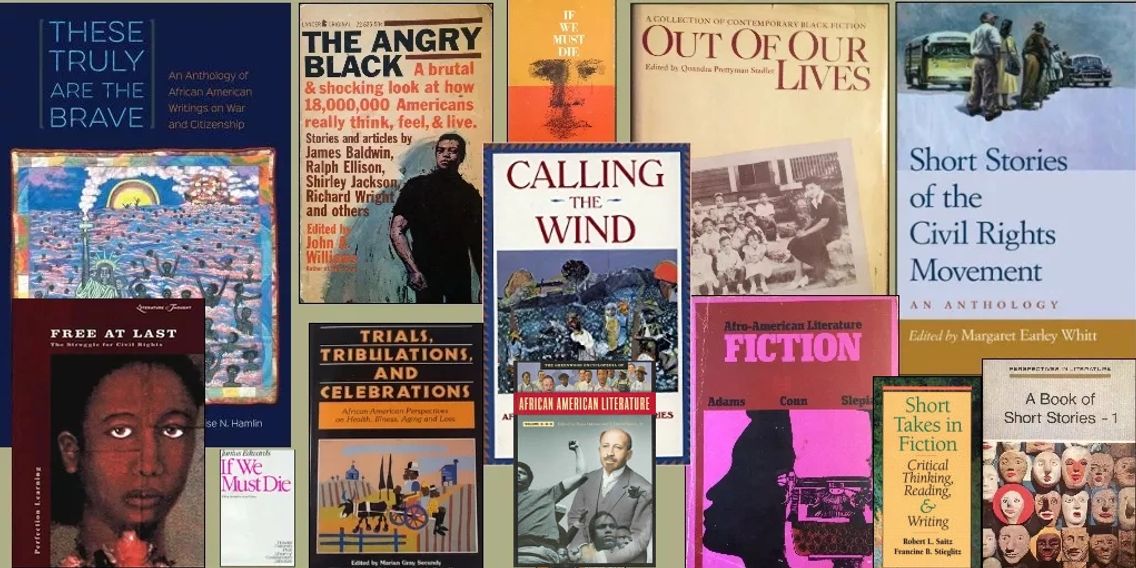

Short Stories by Junius Edwards are featured in various Book collections and anthologies
Short stories include "Liars Don't Qualify", "Duel With The Clock," "New Blood," and "Mother Dear and Daddy"
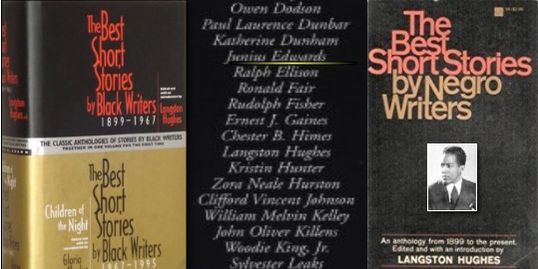

The Best Short Stories by Black Writers - 1899 - 1967 - Anthology Edited by Langston Hughes
Previously published as: The best short stories by Negro writers, this 508 page anthology edited by Langston Hughes includes short stories by writers:
Alston Anderson, James Baldwin, Lebert Bethune, Robert Boles, Arna Bontemps, Gwendolyn Brooks, Frank London Brown, Charles W. Chesnutt, Alice Childress, John Henrik Clarke, Cyrus Colter, Pearl Crayton, Owen Dodson, Paul Laurence Dunbar, Katherine Dunham, Junius Edwards, Ralph Ellison, Ronald Fair, Rudolph Fisher, Ernest J. Gaines, Chester B. Himes, Langston Hughes, Kristin Hunter, Zora Neale Hurston, Clifford Vincent Johnson, William Melvin Kelley, John Oliver Killens, Woodie King, Jr., Sylvester Leaks, Paule Marshall, R.J. Meaddough III, Ronald Milner, Willard Motley, Lindsay Patterson, Ted Poston, Conrad Kent Rivers, Charlie Russell, Mike Thelwell, Jean Toomer, Mary Elizabeth Vroman, Alice Walker, Eric Walrond, Dorothy West, John A. Williams, Charles Wright, Richard Wright, and Frank Yerby.
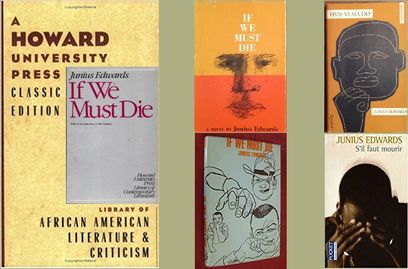

"If We Must Die" - A Novel by Junius Edwards - Book editions in English, French, and Norwegian.
Will Harris is a black Korean War veteran who has returned to his bigoted hometown in the Deep South of the United States. He had been home about two years, recovering from a gun shot wound from Korea, and lives with his mother who is very proud of him. He had a job at the local factory, and looked forward to marrying his girlfriend Mary when he had some money saved up. He also planned to do the impossible - register to vote.
In the registration office at Town Hall, he sees several white men quickly register before him. Will waits and is finally called into the office where he is ridiculed and humiliated for attempting to register to vote. He is eventually rejected on a technicality by the bigoted clerk. Later in the day Will is fired from his job, and is told he will not be able to work again in the town because he went beyond his "place" and tried to register to vote. Will and Mary decide to leave the town if he can't find another job, but as Will walks back home that evening, he is approached and attacked, bound and gagged by several men. What happens next is shocking.
"If We Must Die" - Published by Doubleday & Howard University Press
Scroll Press Reviews
Junius Edwards Inc.Advertising
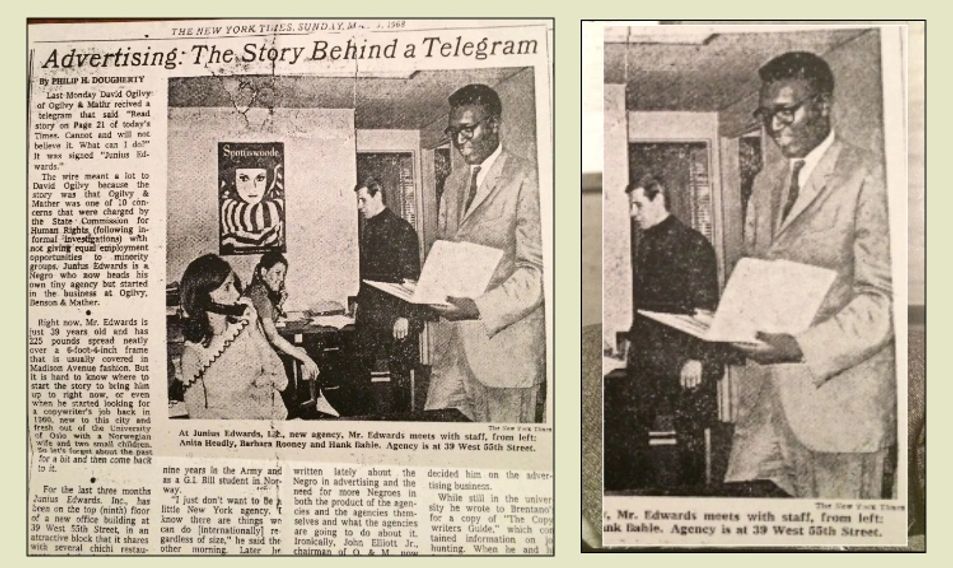

Junius Edwards pictured at his office for this New York Times article about he and David Ogilvy-1968
Junius Edwards was a visionary Adman ahead of his time. During the 1960s, Edwards was a copywriter with three major Advertising agencies before establishing one of the first black-owned advertising agencies in New York City - Junius Edwards Inc. with offices mid-town off Madison Avenue.


Marketing
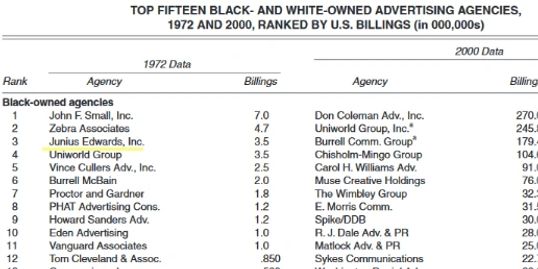

Advertising
Achievements in Advertising
Diversity in Advertising


In the 1970s, Edwards created successful Ad campaigns for Carver Federal Savings Bank to help HARLEM


Advertising Philosophy
"We want to be advertising generalists, not specialists. We are interested in all kinds of clients, and we do all kinds of advertising"
Online Source:
Madison Avenue and the Color Line: African Americans in the Advertising Industry By Jason Chambers


Clients and Brands
Junius Edwards Inc. clients and brands included Faberge, Liggett & Myers, Carver Federal Savings Bank, Robert SONNEMAN Lighting, Greater New York Savings Bank, Chesterfield, Random House, and more.
Voting Rights - Online Lessons


"Liars Don't Qualify" by Junius Edwards
In 1958, Edwards won first prize in the Writer’s Digest Short Story contest for his story “Liars Don’t Qualify,” and the following year he received the Eugene F. Saxton Fellowship for creative writing. Much of his writing focused on racial problems in the American South, and the challenges of Voting rights and registering to Vote. "Liars Don't Qualify" is a story that focuses on this topic, and was written BEFORE the Civil Rights and Voting Rights Acts of 1964 and 1965! Since then, this text has been used as an example and source to teach young and old about the importance of registering to Vote, and participating in the voting process. As we have seen in recent elections, voter apathy and low voter turnout in the African-American community is a huge problem, and the effort to reverse this trend is more important than ever. To this day, there are those who are using voter suppression tactics, intimidation and gerrymandering to influence election results in the United States of America. We must continue to fight this.
Introduction
Notwithstanding the abundant social and personal degradations and humiliations experienced by African Americans as a result of segregation and other racist denials of equal access and human dignity, nothing compares politically to the systematic denial of their right to vote. The Fifteenth Amendment to the Constitution, ratified in 1870, established that “the right of citizens of the United States to vote shall not be denied or abridged by the United States or by any State on account of race, color, or previous condition of servitude.” But all through the South, that right was thwarted by the use of poll taxes and literacy tests, and by various informal kinds of obstruction and intimidation.
This prize-winning story, published in 1961 (before the Civil Rights and Voting Rights Acts of 1964 and 1965) by Louisiana-born writer and entrepreneur Junius Edwards (1929–2008), poignantly recounts an episode of the latter. Will Harris, like Edwards an Army veteran, tries to register in his hometown somewhere in the South, but is given a hard time by two good ol’ boys, Sam and Charlie.
There are several initiatives online which incorporate the story "Liars Don't Qualify" and other works to teach young people about the history and struggle to achieve the right to vote in America.


Online Lessons
TES TEACH -Students are encouraged to learn more about the history of Civil and Voting Rights using these lessons online which are based on "Liars Don't Qualify" by Junius Edwards.
Securing the Right to Vote: The Selma-to-Montgomery Story
What conditions created the need for a protest march from Selma to Montgomery, Alabama, in 1965, and what did that march achieve?
Have students read and discuss the short story, "Liars Don't Qualify" - Students should also complete the "Liars Don't Qualify" Worksheet.


What So Proudly We Hail
Read the story "Liars Don't Qualify" from "What So Proudly We Hail" online eCurriculum. This story about the struggle to register to vote is also included in the collection "THE MEANING OF MARTIN LUTHER KING JR. DAY" online here
Don’t Know Much About History
A teacher tells this story from school: "My students, struggling readers all, are reading a chapter from Junius Edwards' novel, If We Must Die."
Messages for Junius Edwards
I am a high school English teacher in Massachusetts and was prepared to teach the short story "Mother Dear and Daddy" tomorrow, April 14th. I googled Junius's name for biographical information and was stunned to see that he has recently passed. My sincere condolences to his family and friends. His writing was heartfelt and moving.
~ Frank Mandosa,
Stoughton, Massachusetts
Junius and I shared an office as copywriters for Ogilvy In 1961. He seemed to savor every minute of every day -- an inate wisdom I try to remember daily. He was a valiant man--and his smile could light up the room! He was good with the words too but he never let success bend him. We had a lot of fun!
~ Robert Haydon Jones
Recently, my long-time colleague and dear friend, who Jamaican, and I were talking about the race issues she is still aware of in the workplace. In the course of our discussion, I described meeting Junius in 1964, on his first day as a fellow “cub” copywriter at Norman Craig & Kummel. I said that Junius was, I believe , the only person of color at the agency at that time...
~ Valerie Markwood
I was saddened to read about your husband and father's passing.
For many years, I taught both English and U. S. history in a very white New Jersey suburb. To bring home the full impact of Jim Crow to my classes, I would assign "If We Must Die" (the excerpt about attempting to register to vote), without telling them to read the author's bio first.
Invariably, they were stunned to learn that he was a black man, they had so completely identified with the protagonist. It was the beginning - I could hope - of an important learning process for them. So I will always remember his talent as a writer and as a messenger of truth.
Sincerely, Carole Kenyon
Please accept my sincere condolences for your loss. Junius Edwards was an important figure in African American literary culture. Prior to reading the notice of his passing this past March, I had been attempting to contact him about reprinting his short story "Liars Don't Qualify" but was unable to locate him. I was shocked and saddened to find that I would not have an opportunity to communicate with him personally.
I know this is a difficult time for your family, but I am still interested in reprinting his story in my forthcoming book on war, citizenship, and patriotism in African American literature. The book is under contract to be published by Rutgers University Press in 2009 and the title is /War, Freedom, Citizenship, and Patriotism/: /An Anthology of African American Writings/.
Again, please convey my condolences and blessings to the entire Edwards family.
A Yemisi Jimoh, PhD Professor W.E.B. Du Bois Department of Afro-American Studies University of Massachusetts
Though Junius and I were never close friends, I'm sure he was aware of me, as I was of him. I sort of broke the color barrier in general market advertising when I started at Y&R in 1955. It was a long time after that before other agencies did the same. It gave me a great sense of joy to see Junius enter the field. His brilliance cut through the prejudice that still tarnishes the industry. I applaud the obvious success his life produced. I know it will be an inspiration to future generations. Please let me know if there will be a memorial service. I would like to attend.
~ Roy Eaton
My heartfelt condolences to Aunt Inger and all of our cousins on behalf of my family in Texas.
I was inspired by Uncle Junius's writings and his many accomplishments. I enjoyed telling stories about my Uncle's life, as I traveled the world. My memories of Junius have always been full of the brilliance of his personality and character. He was a very special man, who made life work in his favor.
I want to extend my condolences and express my profound sadness regarding the loss of my beloved uncle. Please accept my prayers and sympathy to each of you on behalf of my family members. We all are comforted in knowing that Uncle Junius is with his brother - my father.
Find comfort in your family members and strength in the message of prayer.
~ Emmerson Edwards
With profound sadness I salute my dear freind JJ. I had the great pleasure of working with JJ on his 'entrepreneurial endeavors in the health, publishing, and airline industries'.
What a brilliant man! Such a sharp mind. Thoughtful and generous. A real Friend.
JJ truly was 'a wonderful and inspiring man'.
Love
Gregory Lewis
Other Sources online:
I met Junius in Oslo, Norway, half a century ago, right after we'd both been discharged from the US Army and just before I met Lise, to whom I have been married for nearly forty-eight years. We met Inger shortly afterward.
Junius and I had much to talk about, including the army, writing and Norwegian girls. We swapped a lot of stories.
During the next few years we both married and moved back to the US. We and our children visited their family in White Plains, Manhattan and Vermont, and they visited us in Boston.
Some time after that we lost contact, but I often thought about Junius' kindness, his wisdom and his humor, and I have been telling his stories for years. I hope to have a chance to tell some of them to his family. I miss him more than ever.
~ Myles Striar
Contact
Junius Edwards' legacy lives on
through his written works, his pioneering career in Advertising and business, and the memory of his enduring love and dedication to his family.
JuniusEdwards.com
Thanks for visiting!
A special hello to students around the world, who continue to enjoy reading Junius Edwards' books & short stories.









